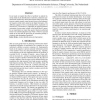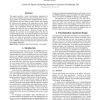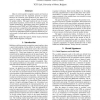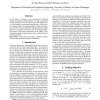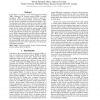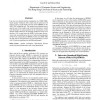INTERSPEECH
2010
14 years 7 months ago
2010
We consider the problem of predicting the surface pronunciations of a word in conversational speech, using a model of pronunciation variation based on articulatory features. We bu...
128
click to vote
INTERSPEECH
2010
14 years 7 months ago
2010
This paper presents our experiments in question answering for speech corpora. These experiments focus on improving the answer extraction step of the QA process. We present two app...
INTERSPEECH
2010
14 years 7 months ago
2010
In our study, we explore the effect of synthetic vs analytic listening mode on the identification of emotions. Numerous psychoacoustic studies have shown that listeners differ in ...
INTERSPEECH
2010
14 years 7 months ago
2010
Two speech feature sets, RMS rhythmicity and formant frequencies F1-F4, are analyzed for their ability to distinguish alcoholized from sober speech. We describe the statistical fr...
INTERSPEECH
2010
14 years 7 months ago
2010
This paper describes a talker discrimination experiment in which native English listeners were presented with two sentences spoken by bilingual talkers (English/German and English...
101
click to vote
INTERSPEECH
2010
14 years 7 months ago
2010
Most of current speaker recognition systems are based on features extracted from the magnitude spectrum of speech. However the excitation signal produced by the glottis is expecte...
INTERSPEECH
2010
14 years 7 months ago
2010
In this paper, we propose a new semi-supervised training method for Gaussian Mixture Models. We add a conditional entropy minimizer to the maximum mutual information criteria, whi...
126
Voted
INTERSPEECH
2010
14 years 7 months ago
2010
In this paper, we propose a novel boosted mixture learning (BML) framework for Gaussian mixture HMMs in speech recognition. BML is an incremental method to learn mixture models fo...
95
Voted
INTERSPEECH
2010
14 years 7 months ago
2010
The prosody of a sentence (utterance) when it appears in a discourse context differs substantially from when it is uttered in isolation. This paper addresses why paragraph is a di...
INTERSPEECH
2010
14 years 7 months ago
2010
Last year, we showed that the computation of a GMM-UBMbased speaker verification (SV) system may be sped up by 30 times by using a high-density discrete model (HDDM) on the NIST 2...

